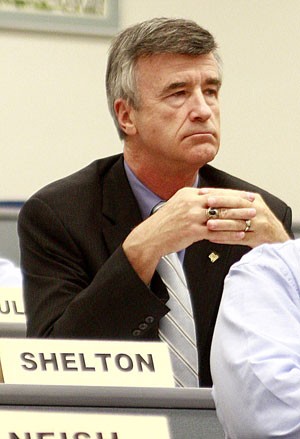In light of a report detailing considerable unrest, loss of focus and demoralization among faculty in the College of Medicine, UA President Robert Shelton emphasized yesterday the college’s role in keeping the UA a top research institution nationally.
“”I want to thank the Committee (of Eleven) for their report,”” Shelton said while speaking at a Faculty Senate meeting. “”For this institution to move up in the top 10 research institutions, the College of Medicine is absolutely essential.””
The report, presented by Sen. Martin Weinand, a surgery professor, was authored by the university’s Committee of Eleven, which represents all faculty and is intended to capture and convey their concerns to the general faculty or the Faculty Senate.
The document cited a feeling among faculty that the relationship of the College of Medicine, University Physicians Healthcare and University Medical Center is not conducive to practicing academic medicine.
Committee of Eleven reports
Some of the key concerns faculty at the College of Medicine have provided to the Committee of Eleven:
? A salary-funding model that does not value research excellence.
? A wide-spread view that there are “”consequences”” if faculty and/or department heads question policies.
? A very pervasive sense of loss of collegiality, which generates low morale and distrust.
? Administrative tactics that favor those who support the initiatives and punish those who question them resulting in an overall lowering of morale.
? Large amounts of research space currently vacant.
? Departments having no direct role in searches for their own heads.
The feeling stems from the fact that all doctors who are also faculty members are employed by UPH, a nonprofit private corporation, the report states.
Among faculty complaints mentioned in the document is that if doctors have tenure with the UA, it is not clear whether UPH can terminate them.
The list of concerns also includes unhappiness on the part of faculty because faculty members are not consulted in the selection of department heads; the significant amount of unused research space; and the lack of clarity about the path faculty members must take to gain tenure.
The report cites a feeling of low morale and distrust steaming from what the report calls “”a very pervasive sense of loss of collegiality.””
It claims a loss of morale from a feeling that there are repercussions for questioning established policies and a salary system that does not promote research.
The report concludes with recommendations that academic medicine become more of a focus and encourages more participation and input from faculty and faculty government.
The Committee of Eleven began investigating problems at the college in September after concerns regarding morale and overwork were brought to their attention.
The committee held 17 meetings during the fall and winter and gathered feedback from more than 130 faculty members, in addition to 10 current and four former department heads.
Shelton said he understands the report raises serious issues, and that the administration is working to solve these issues, although he didn’t elaborate how.
He also cited the expansion of UPH to Kino Community Hospital. He said the move is good for the long term, in that it should enhance the UA’s reputation as a research institution, but is proving to be stressful in the short term as doctors take on greater patient loads.
Faculty senators who spoke on the report yesterday emphasized the importance of faculty dialogue in correcting the problems facing the college.
“”There needs to be free and frank discussion between all levels to solve these problems,”” said Sen. John Ulreich, an English professor. “”Our role is to support our colleagues at UMC to open up discussion””









